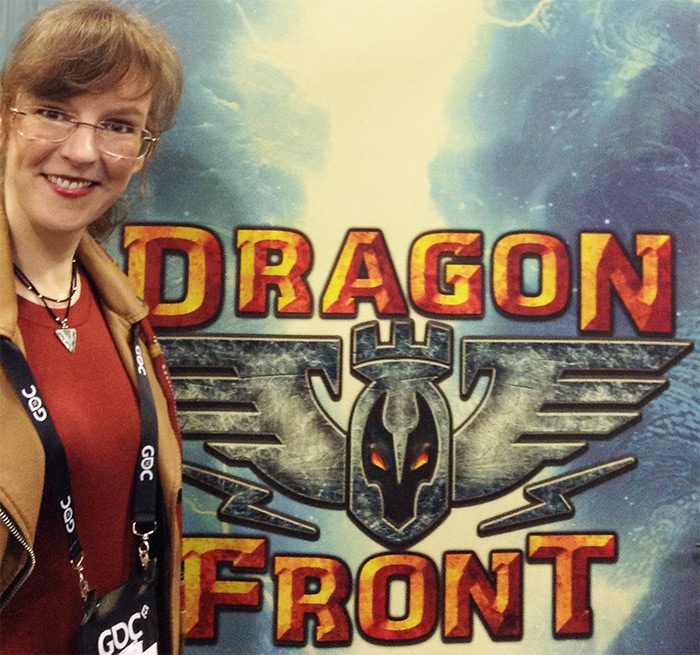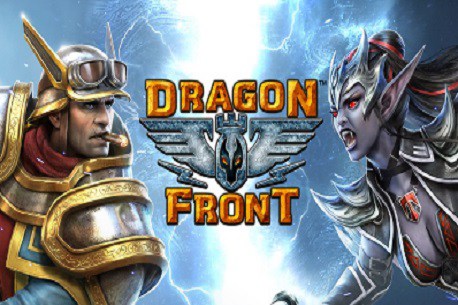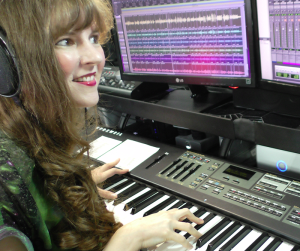
Featured Blog | This community-written post highlights the best of what the game industry has to offer. Read more like it on the Game Developer Blogs or learn how to Submit Your Own Blog Post
Video game composers can make you smarter! (The music of Dragon Front) Part 3
In the last of a 3-part series, video game music composer Winifred Phillips explores how music enhances focus & cognition in strategy gamers. Part 3: tension-regulating affect, with examples of Phillips's music from the Dragon Front virtual reality game.


By Winifred Phillips | Contact | Follow
Welcome to the third (and final) article in this three-part discussion of how video game composers (like us) can make strategy gamers smarter! We've been exploring the best ways that the music of game composers can help strategy gamers to better concentrate while making more sound tactical decisions. During this discussion, I've shared my personal perspective as the composer for the popular Dragon Front strategy game for VR.
In part one, we discussed the concept of 'music-message congruency,' so if you haven't read that article yet, you can read it here. In part two, we explored the meaning of 'cognition-enhancing tempo' - you can read that article here. Please make sure to read both those articles first and then come back.
Are you back? Awesome! Let's launch into a discussion of the third technique for increasing the smarts of strategy gamers!
Tension-regulating affect
 In psychology, the term 'affect' refers to emotion, particularly in terms of the way in which such emotional content is displayed. Whether by visual or aural means, an emotion can not be shared without some kind of 'affect' that serves as its mode of communication from one person to another. When we're happy, we smile. When we're angry, we frown.
In psychology, the term 'affect' refers to emotion, particularly in terms of the way in which such emotional content is displayed. Whether by visual or aural means, an emotion can not be shared without some kind of 'affect' that serves as its mode of communication from one person to another. When we're happy, we smile. When we're angry, we frown.
Extending this principle to music, an 'affect' can be used as a comprehensive term encompassing the perceived emotional content of the music. For instance, the affect of Mozart's Lacrimosa is deeply mournful. No one would argue with this conclusion -- the composition is famous for its pervasive sense of somber lament. As an expert in portraying emotion through music, Mozart wished to convey profound sadness to us through this composition, and he succeeded.
We can consider all music to have its own affect. Human beings instinctively empathize with communicated emotion, which may be the reason why music is so powerful in provoking emotional responses in listeners. As game music composers, we're very comfortable in creating video game music that radiates with specific emotions designed to elicit reciprocal emotional reactions in our players. Vicious combat music will display a strong angry affect: hopefully this will inspire players to attack their in-game enemies with obstinate rage in their hearts! Likewise, music with a lively and cheerful affect may cause players to grin while working their way through that challenging puzzle sequence.
So, what is the best musical affect to facilitate concentration during strategic and tactical gameplay? This is a complicated question to answer. Many emotions also stimulate a corresponding degree of tension and/or excitement, and as we'll see, tension can be a problem when it comes to achieving optimal concentration.
 In a study conducted at the University of Miami and published in the Journal of Music Therapy, a sample of psychology students were tested in regards to their ability to focus and concentrate while listening to differing styles of music. The study found that music which served to induce tension and stimulate the subjects also interfered with their ability to concentrate, whereas music that kept the subjects relaxed also facilitated their ability to focus.
In a study conducted at the University of Miami and published in the Journal of Music Therapy, a sample of psychology students were tested in regards to their ability to focus and concentrate while listening to differing styles of music. The study found that music which served to induce tension and stimulate the subjects also interfered with their ability to concentrate, whereas music that kept the subjects relaxed also facilitated their ability to focus.
This outcome extends to audiences of all ages. In a study published in the journal Educational Studies, researchers from the University of London attempted to determine if the performance of school work by children would benefit from specific background music choices. Gathering a group of 30 children between the ages of 11 and 12, the researchers instructed the children to complete a selection of memory tasks, while playing music that was either exciting or calming. The children performed significantly better when listening to the calm music, while their academic performance declined while the exciting, tension-inducing music played.
Finally, there's a physical component to this phenomenon that's quite interesting. In part two of this series, we discussed how fast tempos caused drivers to commit many more traffic violations from a lack of attention and concentration.
 In the same vein, according to the Oxford Handbook of Music Psychology, when drivers are listening to highly exciting or tension-inducing music while driving, their field of vision becomes physically narrower.
In the same vein, according to the Oxford Handbook of Music Psychology, when drivers are listening to highly exciting or tension-inducing music while driving, their field of vision becomes physically narrower.
This, of course, increases the likelihood of accidents, but it also suggests a contraction of focus and concentration that might cause the listener to be oblivious to important perceptual cues.
All of these studies suggest that in order to create music that best facilitates concentration for strategic thinking, we video game music composers should consider reserved, calm-inducing emotions as the centerpiece of our compositions. For Dragon Front, however, this becomes a problem.
 When the overarching themes of the game are driven by epic fantasy warfare with industrial-age weaponry, the idea of a calm and reserved musical score becomes unsupportable. Even so, creating a warlike musical backdrop with its usually associated tension and aggression would be highly disruptive to player concentration. To remind us of the aggressive nature of the Dragon Front fictional world, let's take another look at the game's official release trailer, featuring several music selections I composed for the Dragon Front game:
When the overarching themes of the game are driven by epic fantasy warfare with industrial-age weaponry, the idea of a calm and reserved musical score becomes unsupportable. Even so, creating a warlike musical backdrop with its usually associated tension and aggression would be highly disruptive to player concentration. To remind us of the aggressive nature of the Dragon Front fictional world, let's take another look at the game's official release trailer, featuring several music selections I composed for the Dragon Front game:
So, how to reconcile the aggression of the Dragon Front world with the need to keep players calm in order to facilitate cognition? In the end I decided to keep the tension in the in-game music well-regulated, so that energy levels never significantly sparked or flared, but remained at a moderate simmer throughout all of the tracks. While the music did contain moments of understated aggression and anger, these emotions were clearly under tight control at all times.
 Let's take as an example the Strife faction - one of the most aggressive factions from Dragon Front. Strife is described like this:
Let's take as an example the Strife faction - one of the most aggressive factions from Dragon Front. Strife is described like this:
Strife doesn’t care about you. Strife barely cares about itself. All Strife cares about is blowing up as much of the world as it possibly can. Strife decks are for aggressive players through and through. Its cards are all about hitting hard, hitting fast, and making the other guy think twice about hitting back. If you’ve ever shot a bottle rocket at friend just “to see what would happen” then Strife is the faction for you.
So, how do we create calm music for a faction like Strife? Through the use of 'Tension-regulating affect.' The music conveyed the appropriate emotion, but in such a way that it tightly controlled the amount of tension and kept the overall atmosphere composed and focused. To see this technique in action, let's listen to an example of the music for the ultra-aggressive Strife faction:
Conclusion
In these three articles we've explored how music influences concentration, enabling effective strategic gameplay and keeping gamers in top intellectual condition. We've considered 'music-message congruency," and how music that aligns well with the subject matter of the game aids players in staying focused. We've explored the influence of 'cognition-enhancing tempo," and the power of a measured and conservative beat to assist the reasoning and tactical planning of our players. Finally, we've explored the idea of a 'tension-regulating affect," which carefully encourages player composure while conveying a meticulously structured emotional atmosphere. All of these elements combine to help players succeed in highly strategic games like Dragon Front. I hope you'll consider using these techniques in your music for strategy games. Together, we composers can make strategy gamers smarter! Thanks for reading, and please feel free to share your thoughts in the comments section below!
 Winifred Phillips is an award-winning video game music composer whose most recent project is the triple-A first person shooter Homefront: The Revolution. Her credits include five of the most famous and popular franchises in video gaming: Assassin’s Creed, LittleBigPlanet, Total War, God of War, and The Sims. She is the author of the award-winning bestseller A COMPOSER'S GUIDE TO GAME MUSIC, published by the Massachusetts Institute of Technology Press. As a VR game music expert, she writes frequently on the future of music in virtual reality video games.
Winifred Phillips is an award-winning video game music composer whose most recent project is the triple-A first person shooter Homefront: The Revolution. Her credits include five of the most famous and popular franchises in video gaming: Assassin’s Creed, LittleBigPlanet, Total War, God of War, and The Sims. She is the author of the award-winning bestseller A COMPOSER'S GUIDE TO GAME MUSIC, published by the Massachusetts Institute of Technology Press. As a VR game music expert, she writes frequently on the future of music in virtual reality video games.
Follow her on Twitter @winphillips.
Read more about:
Featured BlogsAbout the Author(s)
You May Also Like







.jpeg?width=700&auto=webp&quality=80&disable=upscale)








